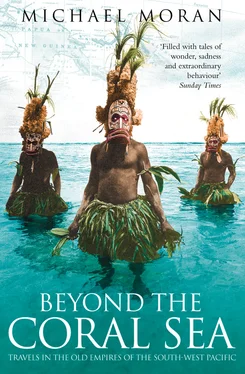Their fierce expressions changed at once to broad smiles of extreme friendliness. But the visitors must always make the first move.
‘Wallace has been telling me all about your important government work. What are you doing on the island?’ I was tactfully pouring a glass of the luminous cordial so as to avoid appearing overly inquisitive. Wallace beamed from his proprietor’s perch.
‘I’m Napoleon, Assembly Clerk for the Milne Bay Province and this is the Principal Adviser to the Provincial Government. He’s from Morobe Province. We are running a seminar for local councillors. Welcome to our difficult and beautiful country.’ The introductions seemed overly formal, even odd, in this place that had clearly seen better days.
I was on Samarai, a tiny island in China Strait that lies off the southeastern tip of Papua New Guinea, described before the Great War as ‘the jewel of the Pacific’. It was the original port of entry to British New Guinea and had been the provincial headquarters before Port Moresby. This gem lay on the sea route between China and Australia. The tropical enchantment cast by Samarai was loved by all who visited it. Destroyed by the Australian administration in anticipation of a Japanese invasion that never happened, it was now more like the discarded shell of the pink pearls still harvested nearby.
Having dinner with the descendant of a cannibal, a man who spoke reverentially and compulsively of the shedding of the blood of Christ whilst humming ‘All things bright and beautiful, all creatures great and small’, was just the beginning of a cultural adventure through the largely unknown islands of Eastern Papua New Guinea.
1 Pidgin for ‘food’ is kai kai. Here it is used as a passive verb – to be kai kai ’d is to be eaten.
1 Steamships Group is one of the largest public companies in Papua New Guinea with many diverse business interests apart from shipping. The original Australian company was established in adverse circumstances in Port Moresby in 1924 by a retired sea captain, Algernon Sydney Fitch, the first branch opening on Samarai in 1926.
1. Forsaking Pudding Island
London
29 September 1999
It was raining heavily as I clambered out of the taxi in the Mall and ran up the grand flight of steps past the Duke of York column into Waterloo Place. The statues of the explorers Sir John Franklin and Captain Scott looked stern and Olympian. I was heading for the High Commission of Papua New Guinea through a forest of history and high culture, umbrella up, head down. The high classicism of Nash’s Via Triumphalis, former site of the Regent’s wanton and ruinous Carlton House, could not have contrasted more strongly with the musky odour in the corridor of pagan carvings that led to the High Commissioner’s office. Grimy windows overlooked Waterloo Place. The national flag wrapped around its pole badly needed cleaning. Papua New Guinea time and GMT were indicated by rough signs on mismatching clocks. This was clearly the lair of a culture unconcerned with cosmetic niceties. His Excellency Sir Kina Bona, the High Commissioner, was chewing gum and watching the Rugby World Cup as I wandered in. He had an instantly likeable face and seemed unaffected by his diplomatic status.
‘How do you do, sir?’ I held out my hand respectfully.
‘Much better if I could get out of here mate! Do you like rugby? What can I do you for?’
The gum thunked into the bin. Rugby was the furthest thing from my mind, but this was a promising beginning. He had a refined, educated air and wore fine-rimmed glasses. Underneath the banter I felt a moral outlook at odds with the modern political world.
We sat down and began to talk. An islander from Kwato in Milne Bay Province, he had attended the mission school as a child, secondary school in Sydney, studied Law at the University of Papua New Guinea and was Crown Prosecutor at the Public Prosecution Office until 1994 when he was subsequently appointed to the post of High Commissioner. Married to a ‘Lancashire lass’, he should have left London two years ago.
‘Britain has little interest in PNG but all the Commonwealth High Comms cooperate very well.’
Grotesque Sepik river masks grinned down like a nightmare from another world.
‘Where are you off to?’ he enquired vaguely, settling uncomfortably into a leather chair.
‘I’m planning a trip around the islands next year. I don’t intend to go to the Highlands at all. Far too violent. Just the islands.’
‘Yes – the violence. Moresby is pretty bad. The police are so under-funded that corruption is rife … the jungle hardly lends itself to strict policing. Not like Surrey!’
He laughed with a hint of derision at the ease of civilised life.
‘I used to live on Norfolk Island off the coast of Australia. Home to the descendants of the Bounty mutiny.’
I was fighting to establish a rapport with this fellow islander, some common ground. The masks seemed threatening in Waterloo Place. The contrast was suffocating.
‘Really? Islands are special places. I miss the sweet waves of Samarai and Kwato on moonlit nights. Cities, well …’
He drifted off into an unexpected romantic reverie. I explained myself.
‘I got bored with catching the seventy-three bus down Oxford Street to Victoria every morning. Threw it up in the end. The job I mean.’
‘What were you doing?’
‘Teaching languages.’
‘I had fine English teachers at the Mission. The very best.’ He paused. ‘Now we only bash the missionaries during election time!’ He grinned broadly.
After some desultory chat about the independence movement in East Timor and the excitement of family life in Hampstead Garden Suburb I rose to leave.
‘I’ll send you some family contacts and useful people to look up. They’ll look after you, or eat you!’ More good-natured laughter.
I signed the visitor’s book and left the office. I was heading for Berry Bros in St James’s to collect a good bottle of red Graves. A final farewell to civilisation. A feeling of exhilaration passed over me as I glanced back through rain-lashed Waterloo Place at the windows harbouring that alien world. For a moment I watched the beads of water running off the polished bonnet of his midnight-blue diplomatic Jaguar.
I was about to escape from Pudding Island.
The original idea of sailing a copra schooner called Barracuda around the islands of Eastern Papua New Guinea in the spirit of Robert Louis Stevenson had faded, as do so many boyhood dreams. I. had always wanted to sail the old vessels of the past on those remarkable voyages of discovery. My friends at the Royal Papua Yacht Club laughed at the idea and told me that all the old ketches and schooners had rotted in the mud. The price of copra had collapsed and the corpse of the industry was barely twitching. No one would dream of wasting money building or even repairing an old copra schooner. There were no more sailing ships plying the islands. Traditional sailing canoes like the majestic lakatoi of Port Moresby with their towering crab-claw sails and multiple hulls had by now almost completely disappeared. Chartering a vessel as an individual was prohibitively expensive. Even if I had sailed my own yacht I could easily become a victim of unfavourable trade winds or worse, piracy. Unless I was prepared to wait for unreliable boats from Thursday Island in the far north of Australia, it was impossible legally to enter Papua New Guinea except by air through Port Moresby or Mount Hagen in the Highlands. I was disappointed but determined to sail at least part of the Australian coastline in the old style, completely dependent on the vagaries of wind and weather.
A rare opportunity arose to ‘take passage’ on the replica of Captain Cook’s ship Endeavour as a supernumerary member of the crew. That it was sailing in precisely the opposite direction to my intended destination did not disturb me. I would experience sailing a tall ship along the New South Wales coast for a week from Southport (near Brisbane) to Sydney. A suitably nautical frame of mind would then enable me to jet off to Port Moresby with equanimity.
Читать дальше












